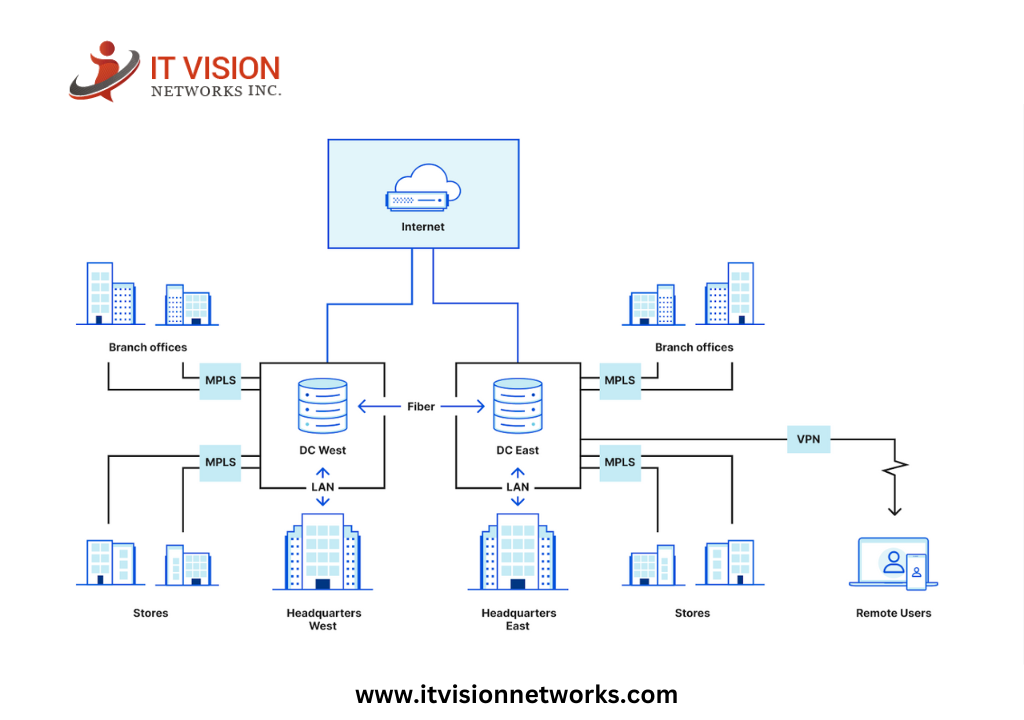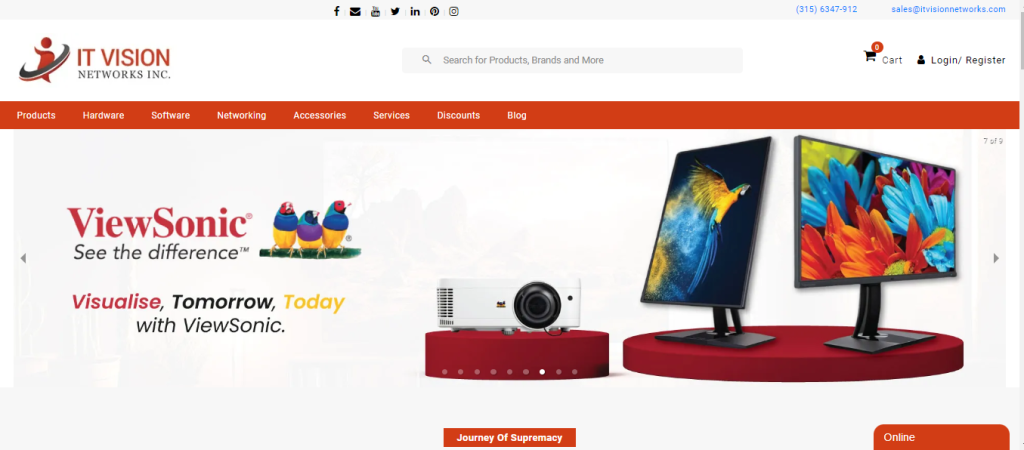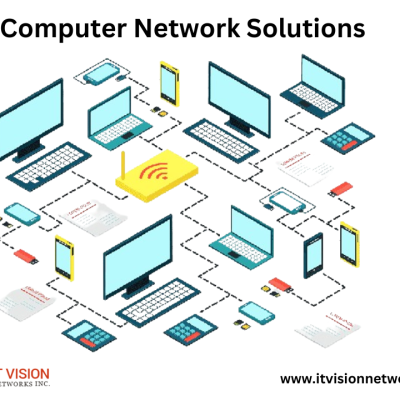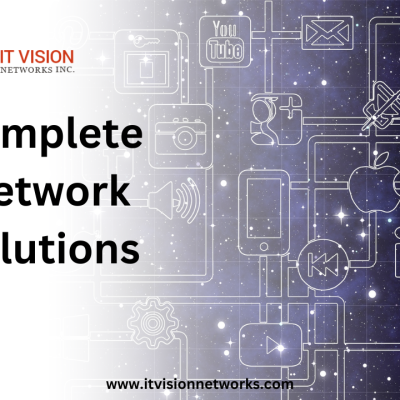What is Network Solutions
In simple terms, network solutions refer to the various technologies and services that enable businesses to connect and communicate seamlessly within their internal network and with the outside world. A well-designed network solution is the backbone of any organization, providing the infrastructure needed for data sharing, collaboration, and productivity.
Introduction to Corporate Network Solutions

In today’s fast-paced business environment, having a robust corporate network is essential for the smooth operation of any organization. A corporate network is a complex system that interconnects various devices, such as computers, servers, printers, and other network-enabled devices, enabling them to communicate and share information efficiently. It acts as a central hub where employees can access resources, collaborate on projects, and exchange data securely.
The Importance of a Reliable and Efficient Corporate Network
A reliable and efficient corporate network is vital for businesses of all sizes. It ensures that employees can seamlessly connect and access the resources they need to perform their tasks efficiently. A poorly designed or outdated network can lead to slow data transfer speeds, frequent downtime, and communication bottlenecks, hampering productivity and hindering business growth.
Investing in a robust corporate network solution offers several benefits. Firstly, it improves communication and collaboration among employees, enabling them to work together more effectively, regardless of their physical location. Secondly, it enhances data security, reducing the risk of unauthorized access and data breaches. Lastly, it enables organizations to leverage advanced technologies such as cloud computing, the Internet of Things (IoT), and artificial intelligence, allowing them to stay ahead of the competition.
Types of Corporate Network Solutions

There are several types of network solutions available for businesses, each catering to different needs and requirements. Some of the most common corporate network solutions include:
- Local Area Network (LAN): A LAN is a network that connects devices within a limited geographical area, such as an office building or a campus. It allows for fast data transfer speeds and facilitates resource sharing among connected devices.
- Wide Area Network (WAN): A WAN connects devices over a larger geographical area, such as multiple office locations or even different countries. It enables remote access to resources and facilitates communication between geographically dispersed teams.
- Virtual Private Network (VPN): A VPN provides a secure and encrypted connection over a public network, such as the Internet. It allows employees to access the corporate network remotely while ensuring the confidentiality and integrity of data.
- Wireless Network: Wireless networks, also known as Wi-Fi networks, use radio waves to connect devices without the need for physical cables. They offer flexibility and mobility, allowing employees to connect to the network from anywhere within range.
Choosing the Right Corporate Network Solution for Your Business
Selecting the right corporate network solution for your business is a critical decision that can impact your organization’s efficiency, productivity, and security. Here are some factors to consider when choosing a corporate network solution:
- Scalability: Ensure that the network solution can accommodate your business’s current and future growth needs. It should be flexible enough to support additional devices and increased data traffic without compromising performance.
- Reliability: Look for a network solution that offers high reliability and minimal downtime. A reliable network ensures that your business operations run smoothly and minimizes the risk of data loss or system failures.
- Security: Data security is paramount in today’s digital landscape. Choose a network solution that incorporates robust security measures, such as encryption, firewalls, and intrusion detection systems, to protect your sensitive information from unauthorized access.
- Ease of Management: Consider the ease of managing and maintaining the network solution. Look for solutions that offer centralized management tools, remote monitoring capabilities, and easy configuration options to streamline network administration.
By carefully assessing your business requirements and evaluating the features and capabilities of different network solutions, you can choose the one that best aligns with your organization’s goals and objectives.
Benefits of Implementing Corporate Wireless Network Solutions
Wireless networks have revolutionized the way businesses operate by providing employees with the flexibility and mobility to connect to the network from anywhere within range. Implementing corporate wireless network solutions offers several benefits:
- Increased Mobility: With wireless networks, employees can access the corporate network from any location within the office premises, eliminating the need for physical connections. This allows for greater flexibility and collaboration, as employees can work from their preferred location.
- Cost Savings: Wireless networks eliminate the need for costly cabling infrastructure, reducing installation and maintenance expenses. Additionally, they enable businesses to adopt flexible work arrangements, such as remote work or hot-desking, which can result in cost savings on office space and utilities.
- Improved Productivity: Wireless networks enable employees to stay connected and access resources instantly, leading to increased productivity. They can collaborate on projects in real-time, share files seamlessly, and communicate effortlessly, regardless of their physical location.
- Scalability: Wireless networks are highly scalable, allowing businesses to expand their network coverage as their needs grow easily. Additional access points can be added without the need for extensive cabling, making it a cost-effective solution for businesses with fluctuating network requirements.
By embracing wireless network solutions, businesses can unlock a new level of productivity, collaboration, and flexibility, giving them a competitive edge in today’s fast-paced business landscape.
Enhancing Security in a Large Corporate Network

In an era where cybersecurity threats are becoming more sophisticated, ensuring the security of a large corporate network is of utmost importance. Here are some best practices to enhance security in a large corporate network:
- Implement Robust Access Controls: Utilize strong authentication mechanisms, such as multi-factor authentication, to ensure that only authorized individuals can access the network. Additionally, implement access controls at different levels to restrict user privileges based on job roles and responsibilities.
- Regularly Update and Patch Systems: Keep all network devices, including routers, switches, and firewalls, up to date with the latest security patches and firmware updates. Regularly review and update security policies to address evolving threats and vulnerabilities.
- Use Encryption: Implement encryption protocols, such as Secure Sockets Layer/Transport Layer Security (SSL/TLS), to protect sensitive data during transmission. Additionally, encrypt stored data to ensure its confidentiality, even in the event of a security breach.
- Educate Employees on Security Best Practices: Employees play a crucial role in maintaining network security. Conduct regular security awareness training sessions to educate employees about common security threats, phishing attacks, and safe browsing practices. Encourage them to report any suspicious activities promptly.
- Monitor Network Traffic: Deploy network monitoring tools to detect and respond to abnormal network behavior, such as unauthorized access attempts or unusual data transfer patterns. Implement intrusion detection and prevention systems to identify and mitigate potential security breaches.
By implementing these security best practices, businesses can significantly reduce the risk of cyber threats and protect their sensitive data from unauthorized access or data breaches.
Best Practices for Corporate Network Monitoring
Monitoring a corporate network is essential for identifying and resolving network issues promptly, ensuring optimal performance, and detecting security threats. Here are some best practices for effective corporate network monitoring:
- Define Monitoring Goals and Objectives: Clearly articulate your monitoring goals and define key performance indicators (KPIs) that align with your business objectives. This will help you establish a baseline and measure the effectiveness of your network monitoring efforts.
- Select the Right Monitoring Tools: Choose network monitoring tools that provide comprehensive visibility into your network infrastructure, including devices, applications, and traffic patterns. Consider tools that offer real-time monitoring, alerting, and reporting capabilities to identify and resolve issues proactively.
- Monitor Key Metrics: Monitor critical network metrics, such as bandwidth utilization, latency, packet loss, and error rates, to identify performance bottlenecks and ensure optimal network performance. Set thresholds and configure alerts to be notified when these metrics exceed predefined limits.
- Establish Monitoring Policies: Develop monitoring policies and procedures that outline how network monitoring should be conducted, who is responsible for monitoring, and how issues should be escalated and resolved. Regularly review and update these policies to keep up with evolving network requirements.
- Perform Regular Audits: Conduct periodic audits of your network monitoring infrastructure to ensure that it is functioning as intended. Verify that monitoring tools are correctly configured, tracking data is being collected accurately, and alerts are being triggered appropriately.
By following these best practices, businesses can proactively monitor their corporate network, identify and resolve issues promptly, and ensure optimal network performance.
Hybrid Network Solutions for Corporate Hubs
As businesses expand, their network requirements become more complex. Hybrid network solutions offer a flexible and scalable approach to meet the evolving needs of corporate hubs. A hybrid network combines the benefits of both on-premises and cloud-based networks, enabling businesses to leverage the advantages of each. Here are some key characteristics of hybrid network solutions:
- Flexibility: Hybrid networks allow businesses to choose the most suitable network infrastructure for each application or service. Critical or sensitive applications can be hosted on-premises for better control and security, while non-critical applications can be migrated to the cloud for scalability and cost-efficiency.
- Scalability: Hybrid networks offer scalability by allowing businesses to allocate resources based on demand dynamically. They provide the ability to scale up or down quickly, ensuring that companies can meet changing network requirements without incurring unnecessary costs.
- Cost Optimization: By leveraging a mix of on-premises and cloud-based infrastructure, businesses can optimize their network costs. They can avoid upfront investments in hardware and software by utilizing cloud services while still maintaining control over critical applications and data.
- Disaster Recovery: Hybrid networks enable businesses to implement robust disaster recovery strategies by replicating critical data and applications across multiple locations. This ensures high availability and minimizes the risk of data loss in the event of a network outage or disaster.
Hybrid network solutions provide businesses with the flexibility, scalability, and cost optimization needed to support their growing network requirements. By leveraging the strengths of both on-premises and cloud-based networks, companies can achieve a highly efficient and resilient corporate network.
Exploring Corporate Network Solutions Providers

Choosing the right corporate network solutions provider is crucial to ensure the successful implementation and maintenance of your network infrastructure. IT Vision Networks is a leading provider of corporate network solutions, offering a comprehensive range of services tailored to meet the unique needs of businesses. Here are some reasons why IT Vision Networks is the best choice for your corporate network solutions:
- Expertise and Experience: With years of experience in the industry, IT Vision Networks has a team of highly skilled professionals who possess extensive knowledge and expertise in designing, implementing, and managing corporate networks. They understand the challenges faced by businesses and can provide customized solutions to meet their specific requirements.
- Comprehensive Solutions: IT Vision Networks offers end-to-end network solutions, including network design and architecture, hardware and software procurement, installation, configuration, and ongoing network management. They have partnerships with leading technology vendors, ensuring access to the latest network technologies and solutions.
- Proactive Support: IT Vision Networks provides proactive support and monitoring services to ensure the optimal performance and security of your corporate network. Their team of network engineers is available 24/7 to address any issues promptly and minimize downtime.
- Scalability and Flexibility: IT Vision Networks understands that businesses’ network requirements evolve. They offer scalable and flexible solutions that can accommodate your current needs and future growth. Whether you are a small startup or a large enterprise, IT Vision Networks can tailor their solutions to suit your organization’s size and budget.
Conclusion
In today’s digital age, a reliable and efficient corporate network is essential for the success of any business. It enables seamless communication, collaboration, and data sharing among employees, enhances productivity, and ensures the security of sensitive information. By understanding the different types of corporate network solutions, choosing the right solution for your business, implementing wireless network solutions, enhancing security, following best practices for network monitoring, and exploring reputable network solutions providers like IT Vision Networks, companies can establish a robust and future-proof network infrastructure that supports their growth and success.
FAQs
A corporate network solution refers to the various technologies and services that enable businesses to connect and communicate seamlessly within their internal network and with the outside world.
A reliable corporate network is important as it ensures seamless communication, collaboration, and data sharing among employees, enhances productivity, and ensures the security of sensitive information.
Implementing corporate wireless network solutions allows for increased mobility, cost savings, improved productivity, and scalability.
Companies can improve security in a large corporate network by implementing robust access controls, regularly updating and patching systems, using encryption, educating employees on security best practices, and monitoring network traffic.
Some best practices for corporate network monitoring include defining monitoring goals and objectives, selecting the right monitoring tools, monitoring key metrics, establishing monitoring policies, and performing regular audits.






